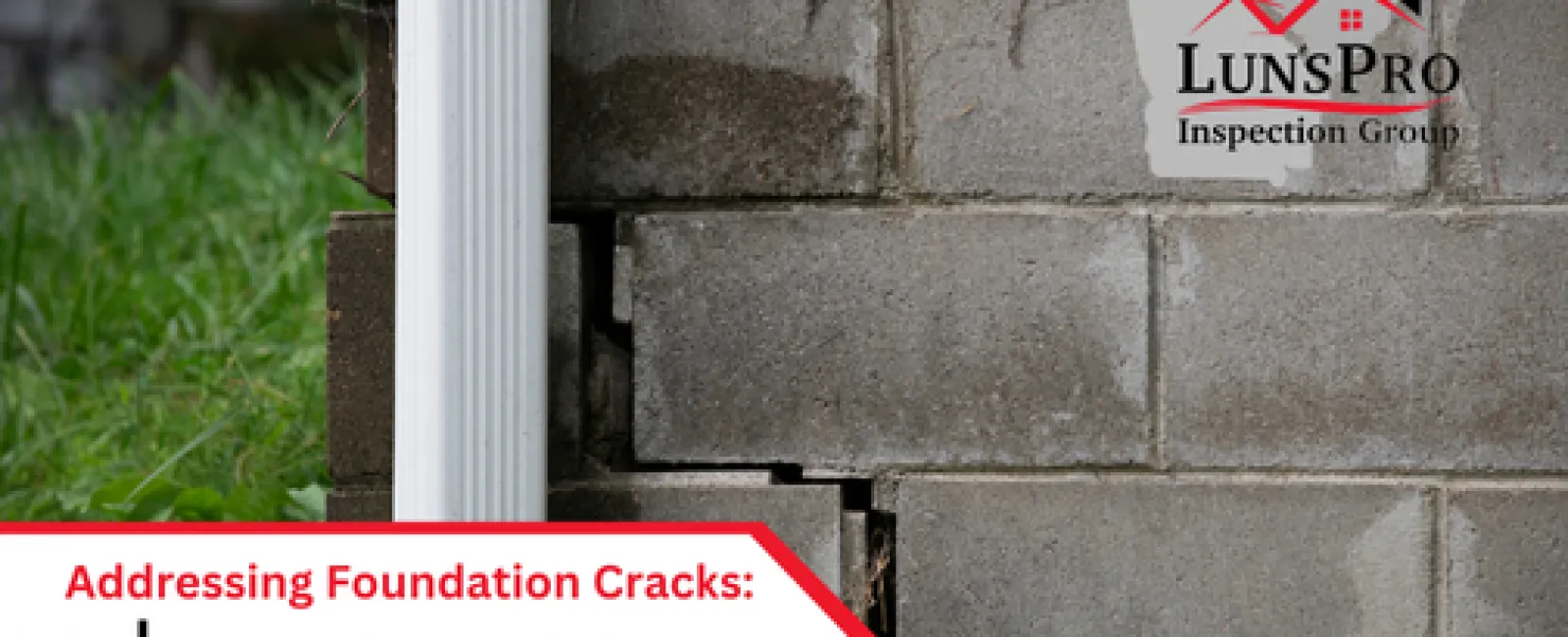A solid foundation is crucial for the structural integrity of any home. Foundation cracks, however, are a common issue that can cause significant concern for homeowners. While some cracks are merely cosmetic, others can indicate serious underlying problems that require immediate attention. Understanding the difference between these types of cracks and knowing when to take action is essential for maintaining your home's safety and value.
For homeowners in Charlotte, NC, and the surrounding Carolina regions, addressing foundation cracks is an important aspect of home maintenance. LunsPro Inspection Group, a trusted name in Carolina residential and commercial inspections, offers the expertise needed to assess and address foundation issues. In this article, we will explore the types of foundation cracks, their causes, potential risks, and the steps homeowners should take to ensure their foundation remains stable and secure.
Types of Foundation Cracks and Their Causes
Foundation cracks can vary in size, shape, and severity. Understanding the different types of cracks can help determine whether they are a cause for concern.
1. Hairline Cracks: These are very thin cracks that are typically less than 1/8 inch wide. Hairline cracks are often the result of the natural settling of a home and are generally not a cause for concern.
2. Vertical Cracks: Vertical cracks run up and down the foundation wall. They are often caused by the normal settling of the house and can be common in newly constructed homes. If they are narrow and consistent in width, they are usually not a serious issue.
3. Diagonal Cracks: Diagonal cracks are wider at one end and narrower at the other. They can occur due to differential settling, where one part of the foundation settles more than the other. These cracks can be more concerning and may indicate structural movement.
4. Horizontal Cracks: Horizontal cracks run parallel to the ground and are the most serious type of foundation crack. They can indicate significant pressure against the foundation wall, often due to soil expansion or hydrostatic pressure. Horizontal cracks require immediate professional evaluation.
5. Stair-Step Cracks: These cracks follow the mortar joints in brick or block foundations, creating a stair-step pattern. They can be caused by differential settling or soil movement and should be inspected to determine their severity.
Risks Associated with Foundation Cracks
Foundation cracks can lead to various problems if not addressed promptly. Some of the potential risks include:
1. Water Intrusion: Cracks in the foundation can allow water to seep into the basement or crawl space, leading to moisture problems, mold growth, and potential damage to the home's structure and contents.
2. Structural Instability: Severe cracks can compromise the structural integrity of the home, leading to uneven floors, doors and windows that don't close properly, and even potential collapse in extreme cases.
3. Pest Infestation: Cracks in the foundation can provide entry points for pests such as insects and rodents, which can lead to further damage and health concerns.
4. Decreased Property Value: Visible foundation cracks can negatively impact the value of your home, making it less attractive to potential buyers and possibly leading to costly repairs before a sale.
Steps to Take When Addressing Foundation Cracks
1. Professional Inspection: The first step in addressing foundation cracks is to have a professional inspection performed by experts like LunsPro Inspection Group. Our Carolina home inspectors are trained to identify the severity and cause of foundation cracks, utilizing advanced tools and techniques, including Carolina drone inspections for comprehensive assessments.
2. Monitoring: For minor cracks, monitoring their progression is crucial. Mark the ends of the crack and check periodically to see if it is growing or changing. Any significant changes should be reported to a professional immediately.
3. Waterproofing Solutions: To prevent water intrusion, consider waterproofing your foundation. This can include exterior waterproofing membranes, interior sealants, and proper drainage systems to direct water away from the foundation.
4. Soil Stabilization: In cases where soil movement is causing foundation cracks, soil stabilization techniques can be employed. This may involve injecting materials to stabilize the soil or improving drainage around the foundation to prevent soil expansion and contraction.
5. Structural Repairs: For more severe cracks, structural repairs may be necessary. This can include installing steel or carbon fiber reinforcements, underpinning the foundation with piers or pilings, or other engineering solutions to stabilize and strengthen the foundation.
6. Regular Maintenance: Regular home maintenance is key to preventing foundation issues. Ensure proper grading around your home to direct water away from the foundation, keep gutters and downspouts clean and functional, and address any plumbing leaks or drainage problems promptly.
Foundation cracks can be a source of anxiety for homeowners, but understanding the types of cracks and knowing when to worry can help alleviate some of that stress. By taking proactive steps to monitor, assess, and address foundation cracks, you can protect your home's structural integrity and value. Regularly inspecting your foundation for changes in crack size or new cracks can help you catch potential issues early. It's also essential to maintain proper drainage around your home to prevent water from exacerbating foundation problems. If you notice any significant or worsening cracks, it's crucial to seek professional help to determine the cause and appropriate solutions.
LunsPro Inspection Group, with its extensive experience in Carolina residential and commercial inspections, is dedicated to providing homeowners in Charlotte, NC, and the surrounding areas with the expertise and solutions needed to address foundation issues. Our team of professional inspectors uses advanced tools and techniques to thoroughly evaluate your home's foundation. We offer a range of inspection services, including Carolina drone inspections for hard-to-reach areas, Carolina septic and sewer scope inspections to check for underground issues, Carolina radon testing to ensure air quality, Carolina mold and air quality testing for a healthy living environment, Carolina pool inspections for your backyard oasis, and comprehensive Carolina home maintenance services.
By relying on professional inspections and taking appropriate maintenance measures, you can ensure that your foundation remains strong and secure for years to come. Regular maintenance such as keeping gutters clean, ensuring proper grading around your home, and addressing any moisture issues promptly can significantly contribute to the longevity of your foundation. Trust LunsPro Inspection Group for all your home inspection needs, and gain peace of mind knowing that your home is in capable hands. Our commitment to excellence and customer satisfaction ensures that you receive the highest quality service, tailored to meet your specific needs.

